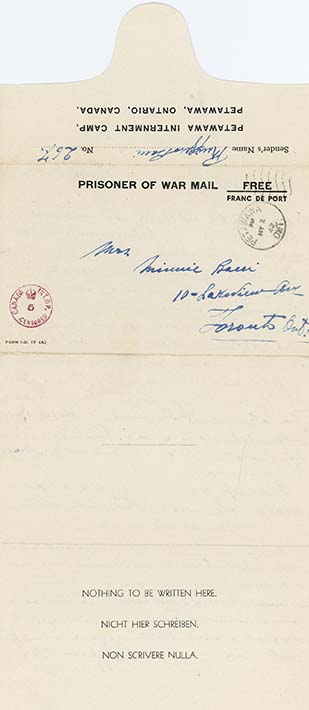Prisoner of War mail, by Ruggero Bacci, to Minnie Bacci, April 27, 1942
This handwritten prisoner of war mail in Italian, was sent by Ruggero Bacci, and is addressed to his wife Minnie Bacci, on April 27, 1942.
Bacci writes that he is happy to receive mail from his family -- his only "pleasure in this prison". He tells his wife that she can continue to write letters on his behalf but she should direct them to those responsible for his internment. He makes a vague reference to her knowing who they are, since he had told her in the past. At this point, Bacci would have been interned for about 22 months.
Receiving mail was an important occasion for internees. For most, letters were the only contact they had with family. Internees were allowed to write three letters and four postcards per month. The maximum length for letters was twenty-four lines and eight lines for postcards. Exceptions were made for those who ran businesses and had to respond to letters from the Custodian of Enemy Property. All camp letters were read by a censor. Contents deemed inappropriate were blacked out with ink. The same applied to incoming mail. Camp letters that were written in Italian were first translated into English before being read by a censor.
In the letter, Bacci notes that he received a photograph of someone named Leo and asks that his wife send one of herself before they were married.
Internees were allowed to receive parcels from family members. These packages were searched thoroughly by camp guards before being distributed. Internees mostly received food and clothing.
It seems Bacci's wife was planning a visit to the camp. He advises her to wait until after the middle of May. He describes the Spring weather as nasty, although he notes the current weather in camp is good -- with the men enjoying the sunshine.
During the early stages of internment, family visits were prohibited at the camps. As time passed, it does seem that in rare cases, family members travelled to Petawawa for a brief meeting with a husband or father.
Bacci ends with a wish that this "cursed life" ends soon. He notes he feels the passage of time and worries about his ability to find work on his return home. He tells her to let him know once she she receives a response -- "if it is not positive, become resigned to living your life without me".
This document forms part of a collection of documents and other materials on loan by the Bacci family.








































